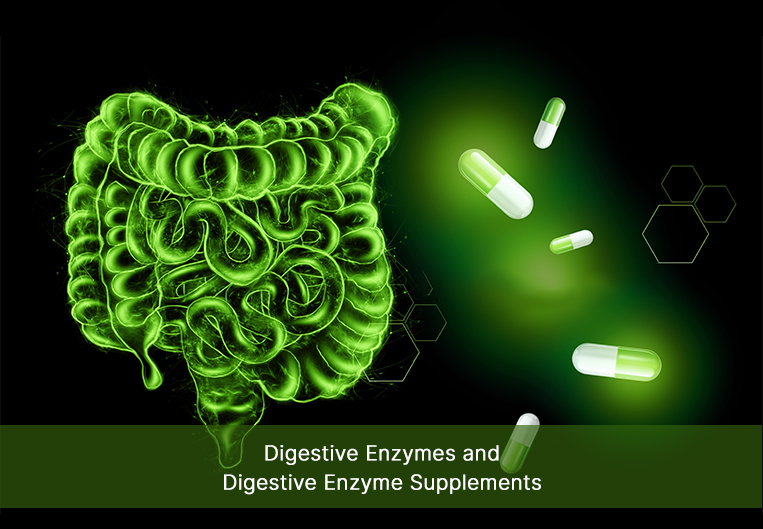Digestive Enzymes and Digestive Enzyme Supplements


Table of Contents
ToggleIntroduction
Everyone loves to eat, but how does food get absorbed and turned into energy? Or how do our digestive systems work? This led to the creation of an interesting blog about digestive enzymes and digestive enzyme supplements.
Now let’s explore this captivating topic further. Consider the pancreas, small intestine, and stomach as a superhero team that makes up our digestive system. Difficulty in converting food into energy is mostly dependent on this guy’s particular team, the digestive enzymes.
Therefore when you take a bite of that tasty burger or salad, your mouth’s saliva is like the first superhero, breaking down the food a bit. But the real heavy lifters are the digestive enzymes.
They’re like the rockstars from your pancreas, doing the VIP job of breaking down proteins, fats, and carbs from your meal.
Think of it as a concert in your stomach – the enzymes are the musicians turning your food into a catchy tune that your body can absorb and use. So, if you’ve got tummy issues or just want a smoother digestion experience, these enzymes are like the backstage crew making sure everything runs smoothly.
Our guide through this enzyme concert is dietitian Morgan Denhard from Johns Hopkins Medicine. She’s here to help us understand why some folks might need extra digestive enzyme support. It’s like having a coach explain the playbook for better digestion. So, whether you’re a foodie or just curious about what happens after you eat, let’s dive into the world of digestive enzymes together!
Various Digestive Enzyme Types
- Lactase:
A sugar called lactose is present in milk and several other dairy products. Its digestion is aided by this enzyme. Lactase is produced by specific cells that line the walls of the small intestine.
- Amylase:
Simpler sugars are produced from complex carbs and starches by the essential amylase enzyme. Their main job is to make these foods dissolve into easy forms so that our bodies can quickly absorb the vitamins and minerals they contain. It’s like amylase is the friendly helper in our digestive system, making sure we get the good stuff from our favourite foods faster and easier!
- Maltase:
With their expertise in breaking down the sugar maltose, which comes from grains, maltose enzymes are an essential part of our digestive team. It effectively breaks down foods that include maltose. they primarily assist in the metabolism of whole carbohydrates.
- Peptidase:
This enzyme acts as a catalyst for protein absorption, ensuring efficient digestion.
These enzymes, with peptidase help in breaking down the proteins into smaller proteins called as peptides. This aids in the smooth digestion of proteins.
- Pepsin:
This enzyme is essential for dissolving proteins into smaller peptides. It is important because they work to break off proteins in the small intestine by starting the process of digestion.
- Lipase:
This digestive enzyme is crucial for cracking down fats into glycerol & fatty acids. It’s important in easing the digestion & absorption of fats from our food which supports overall lipid metabolism in the body.
Also See The Five Importance Of Enzymes In Medicine
Digestive Enzymes Benefits:
The distinct functions of these digestive enzymes bring to light the complex process of dissolving various dietary components, which in turn facilitates the absorption of nutrients essential for general health and well-being.
Who Might Benefit from Digestive Enzyme Supplements?
- Digestive enzyme supplements can be beneficial for individuals with digestive malabsorption disorders, like lactose intolerance, where the body lacks sufficient enzymes for breaking down certain nutrients.
- Those experiencing bloating, gas, or other gastrointestinal symptoms may find relief through these supplements.
Digestive Enzyme Supplements: Where to Find Them:
Digestive enzyme supplements are available from different sources. They can be bought over the counter at pharmacies and health stores. Prescription formulations are recommended for specific cases where a higher dosage or particular enzymes are necessary. Additionally, certain foods like pineapple and papaya naturally contain digestive enzymes.
To take digestive enzymes properly, consider the following:
Dosage recommendations: It’s advisable to consult with a healthcare professional to determine the appropriate dosage tailored to individual needs. Typically, these enzymes are taken before or during meals to assist in the digestion process.
Conclusion
Thus, from now on, we will undoubtedly consider enzymes when consuming food. With our expanded knowledge of the function of digestive enzymes and the possible advantages of digestive enzyme supplements, people will be better equipped to make decisions regarding their digestive health. It’s critical to approach these supplements mindfully, taking into account unique demands and consulting a professional for a comprehensive and customized approach to well-being. Get in touch with us to receive the ideal enzymes for your reputable sector.

